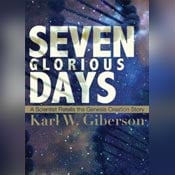Connor Wood
This post is part of a reflection series on the new book Seven Glorious Days, by Karl W. Giberson, at the Patheos Book Club.
In a famous essay entitled “The Effectiveness of Symbols,” the anthropologist Claude Lévi-Strauss quietly made a claim that ought to be central to every thinking person’s understanding of religion. The claim was this: religious experience – in this case, an encounter with a South American shaman – fundamentally forces the experiencer into a confrontation with the parts of life that don’t work. Suffering, absurdity, a bloody breach birth: without the help of the spirits, we turn our heads away from these little catastrophes, and the result is that they proliferate around us like weeds. It takes the gods to jerk our heads back towards the troubles at hand, to confront them directly.
And so it is always with a slight sense of disappointment, of missed opportunity, that I read treatises by Christian writers who try to show that evolution is perfectly compatible with dogma after all, or that a modern cosmology presents no threats to a religious worldview. Karl W. Giberson, a professor of religion and science at Stonehill College, tries to make both claims in his new book, Seven Glorious Days, and the result is a sometimes compelling, but often toothless, retelling of the Genesis narrative for today’s scientifically informed readers.
I should qualify my opinion here: when I say the book is toothless, this is only because I think the issues Giberson is trying to wrangle with are weighty and important, and so I have high standards for his mission. In many ways, this is a good book, a readable introduction to the history of the cosmos for the layperson (presumably a mildly bookish, adolescent layperson). There are dextrous references to the great luminaries of scientific history, from Pierre Laplace to Freeman Dyson, and ably placed quotes from religious believers and skeptics alike. A perfectly lucid description of the creation of heavy elements in supernovae rubs up against matter-of-fact explanations of the evolutionary roots of human love.
Along the way, Giberson makes an intriguing, and in some places compelling, argument for a kind of teleology in cosmic evolution, a Logos moving the universe forward into a relationship with its Creator. It’s a pleasing and theologically cogent narrative, one that works best in the final chapter where Giberson’s Christian commitments are removed from the shadows and placed front and center. It’s here that the emotional current of the book picks up and the reader gets a sense that something real, something urgent, is at stake here.
Here’s the thing, though: the book as a whole has a bit too much feel-goodness and not quite enough urgency, not enough grim acknowledgment of the spiritual tensions that inspired Giberson to write it. The best example, of course, is Darwinian evolution. Giberson spends an entire chapter contesting the claim that evolution is all about competition and struggle, instead casting the Darwinian process as a cosmic cooperative party, in which organisms and species are coaxed into symbiotic relationships and goodwill abounds. It’s a pre-programmed process tailored to produce harmony, intelligence, and love.
He paints a lovely picture. But he’s wrong. Darwinian evolution, according to orthodoxy, is non-teleological. Period. The evolutionary process is not going anywhere; it was not destined to produce intelligence. Neo-Darwinian evolution is random and directionless by definition.
So, while it’s true that evolution has produced love and intelligence, telling young readers to ignore the blood and grimness of evolution is, I think, counterproductive and perhaps disingenuous. You cannot hope to pull meaning out of the maw of Darwinian evolution without first acknowledging its horror. The mathematics alone attests to the suffering: inspired by Thomas Malthus’ models of population spikes and crashes, Darwin assumed that natural selection must depend on the overproduction of offspring. The majority of each generation must perish in order for selection processes to be effective. Evolution runs on blood.
Now, I’m not saying that Giberson and his readers have to buy neo-Darwinian orthodoxy unconditionally. If the history of science is any indication, neo-Darwinism will eventually be replaced by something even more sophisticated and robust. But I do think that, like the shaman in Lévi-Strauss’s famous essay, Giberson and other religious scientists are obliged to point to the darkness, not to obscure it. There are real tensions between an orthodoxly scientific cosmology and the spiritual yearnings of our hearts. The fact that science has done an outstanding job of penetrating the world’s shell, of showing us truths, means that those tensions matter. Something is really at stake here.
When physicist Steven Weinberg (quoted in the book) morosely claims that “(t)he more the universe seems comprehensible, the more it seems pointless,” he is voicing a perspective that can’t be papered over. If that grim scientistic viewpoint is to be confronted on theological, philosophical, or even scientific grounds, it must first be acknowledged as a worthy opponent, backed up by evidence. Otherwise, canny readers will sense that they are being condescended to.
This is where so many religion-and-science writers, including Giberson, miss the mark: they don’t realize that the Steven Weinbergs of the world are playing the vital role of Ecclesiastes, dourly muttering about the meaninglessness of things. By refusing to listen to this dark teaching, such writers stymie the root of religious discourse. Ultimately, it’s only out of honestly felt tension, even struggle, that real meaning – Christian or otherwise – can be wrought.












